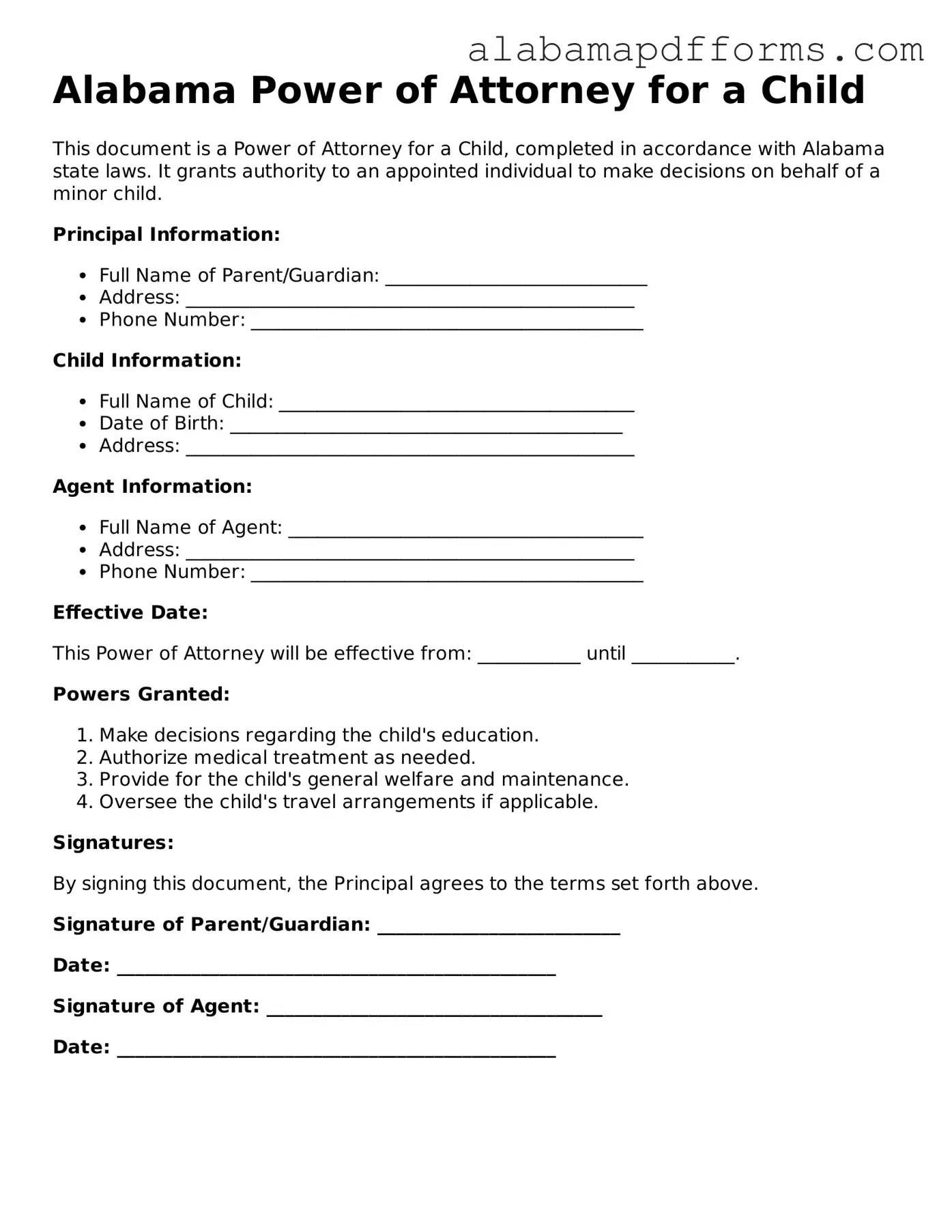The Alabama Power of Attorney for a Child form is similar to a General Power of Attorney. Both documents allow individuals to designate someone else to make decisions on their behalf. However, the General Power of Attorney can apply to a wide range of matters, including financial and legal decisions, while the Power of Attorney for a Child specifically focuses on matters related to the care and custody of a minor child. This distinction makes the child-specific form more tailored to the needs of parents and guardians when they are unable to care for their child temporarily.
Another similar document is the Medical Power of Attorney. This form grants someone the authority to make healthcare decisions for another person. Like the Power of Attorney for a Child, it is used in situations where the original decision-maker is unable to act, such as during a medical emergency. However, the Medical Power of Attorney is specifically limited to health-related decisions, whereas the Power of Attorney for a Child encompasses broader responsibilities related to the child’s upbringing and welfare.
The Guardianship Agreement shares similarities with the Power of Attorney for a Child, as both documents involve the care of a minor. A Guardianship Agreement is typically a more permanent arrangement, often established through a court process. In contrast, the Power of Attorney for a Child is usually a temporary measure, allowing parents to delegate authority for a limited time without needing court intervention. This makes the Power of Attorney a more flexible option for short-term situations.
The Child Custody Agreement is another related document. This agreement outlines the legal responsibilities and rights of parents or guardians regarding a child’s living arrangements and visitation. While the Power of Attorney for a Child allows for temporary delegation of care, a Child Custody Agreement is generally more formal and permanent, often established during divorce or separation proceedings. Both documents serve to clarify parental roles but operate under different circumstances and legal frameworks.
Similar to the Power of Attorney for a Child is the Temporary Care Agreement. This document is used when parents need someone else to care for their child for a short period, such as during a family emergency or while traveling. The Temporary Care Agreement provides a framework for the caregiver’s responsibilities, similar to the Power of Attorney, but it may not confer the same legal authority to make decisions on behalf of the child, focusing instead on day-to-day care.
The Adoption Agreement can also be considered similar. This document formalizes the legal relationship between an adoptive parent and a child. While the Power of Attorney for a Child allows for temporary decision-making authority, an Adoption Agreement establishes a permanent legal bond. Both documents involve considerations of parental rights and responsibilities, but they differ significantly in terms of duration and legal permanence.
The Foster Care Placement Agreement is another document that shares characteristics with the Power of Attorney for a Child. This agreement is used when a child is placed in a foster home due to various circumstances, such as parental inability to care for the child. Both documents involve transferring care responsibilities, but the Foster Care Placement Agreement is typically more regulated and involves state oversight, whereas the Power of Attorney for a Child is a private arrangement between individuals.
The Alabama Power of Attorney for a Child form is essential for parents who need to ensure that their child's well-being is prioritized in their absence. It empowers designated agents to make critical decisions regarding the child's care, education, and health. For those looking for templates or resources related to such important documents, Formaid Org offers valuable information and assistance.
Lastly, the Standby Guardian Designation is similar in that it allows parents to appoint someone to care for their child in the event of an emergency or incapacitation. This document is often used when parents anticipate a need for someone to step in, such as during a serious illness. Like the Power of Attorney for a Child, it addresses the immediate needs of the child, but the Standby Guardian Designation is specifically focused on situations where the parent is unable to fulfill their role, often with a more permanent intent.

